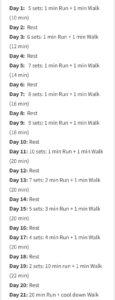Every week, hundreds of enthusiasts, young and old, start to run from zero. They take the plunge and head outdoors for a bit of jogging or they’ve downloaded the “from coach to 5K” program to get them started. And why wouldn’t they; experienced athletes who run marathons seemingly effortlessly, once started from scratch too.
People may start to run because it is good for their physical health, to lose some weight, or to push their own limits. And mental health also benefits from regular exercise. Running can be done anywhere, at any time, and is easily accessible to start with. It is also one of the most effective ways to improve your fitness and burn calories. It is therefore not surprising that many people choose this sport.
 Can anyone start running?
Can anyone start running?
The answers are yes and no. It is said that if you can walk, you are able to run as well. Personally, I am a big fan of running and I would love to motivate many people to give it a go. But sometimes it’s advisable to start with walking or consult your doctor first.
Before you start running on your own, is important to take a few things into consideration. You should be aware of the forces that our bodies have to process during running: roughly three times your body weight with each foot landing. Running also has a big impact of the effort on the heart-lung system.
 When to rather not start running (on your own)?
When to rather not start running (on your own)?
If you’d like to start running you aim to improve, get fitter, feel better, and stay motivated. And you definitely don’t want to get injured or suffer from other health problems. If one (or more) of the following situations relate to you, then it is recommended not to just start running on your own:
- If you cannot walk without pain. Better consult a general practitioner, physiotherapist, or sports specialist.
- If you are overweight (BMI >25) it should not be a no-go to start running, but you should be aware of an increased risk of injury. It is recommended to build the training load very carefully and gradually. It is advisable to use a start-to-run running plan to help you. Always stay alert to pain.
- If you suffer from obesity (BMI >30) it is better not to start running yet. It is recommendable to first try to lower your BMI to below thirty in another way. The best way to do this is to make adjustments to your diet and practice low-impact exercise forms more, such as walking, cycling, or cardio exercises at the gym (walking on the treadmill, cycling on the stationary bike, or rowing on the ergometer, cross trainer or step machine).
- If you have not exercised for a long time or if heart problems run in your family. It is recommended that you first perform a fitness test at a sports medical institution. Discuss your plan to start running with your doctor.
- If you use medication or you experience health problems or breathing disorders (such as shortness of breath or asthmatic complaints), it is also recommended to consult your doctor first.
 Start easy & Build-up gradually
Start easy & Build-up gradually
Never push yourself to the limits from your first run. Start at an easy pace, not too long, and don’t train too frequently in the beginning. Build your fitness and endurance gradually. A professional running coach can teach you a proper running form to prevent injuries, and breathing techniques to sustain longer. This will help you progress.
 Come Run with us!
Come Run with us!
In Ljubljana Slovenia, Morefun2Run offers several Mindful Run® Courses & Workshops that are also suitable for novice runners. Our certified coach will teach you running and breathing techniques. And also how to run mindfully: how to be fully in the present moment during your run, release stress and gain energy! In the fresh outdoor air, we will alternate running, walking, fun games, and breathing exercises.

The Mindful Run® Course includes five weekly sessions of 1.5 hours. The Mindful Run® Workshops are single sessions of 1.5-2 hours. Both, the course and the workshops can be done as a group or individually.
 Make use of a Running Plan
Make use of a Running Plan
To avoid too much training load in the beginning (with risk of injury), you could use one of the FREE MoreFun2 Run Training Plans as your guidance to schedule your running load and take enough recovery time. If you’re new to running, or you haven’t run for a while, you could start with our 21 days run walk program or the 0-5k Running schedule. Once you’re managing a non-stop 5km run, you can choose our 5-10km and Half Marathon training schedules.
 Perseverance & Patience
Perseverance & Patience
Running is an investment that will not pay off in a few days or weeks. It requires perseverance and patience. It can take several weeks until running becomes easier and your body is getting used to it. You are more likely to stay motivated if you’d run with one or more running buddies. Check out if you can find a club or group that offers a Start-to-Run program in your area.
 Set your personal goal
Set your personal goal
To get inspired and to work towards your personal athletic goal, you could even sign up for a running event, such as Park Runs, City Runs or Family Fun runs. You don’t need to be the fastest, as long as you can finish injury-free and have a lot of fun. The achievement will make you feel proud!




